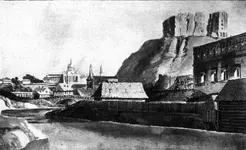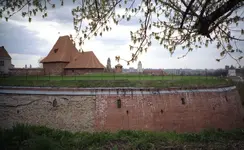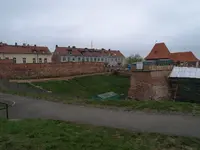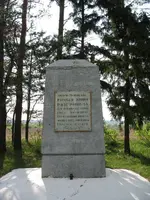Napoleon entered Moscow one week after his victory at Borodino with approximately 100,000 tired men. Most citizens had already taken their belongings and evacuated Moscow by the time the French arrived. The Russians deliberately set fires, and burned three-fourths of the city. Although there was still some habitable shelter, there was no food in Moscow, and typhus raged in the city. The French would stay in Moscow for only one month. There was nothing that they could use in the city, so it was impossible to stay there for the Russian winter.
The Russians refused Napoleon's overtures to surrender. On 19 October, 95,000 French soldiers retreated into the cold, back to Smolensk. Thousands more died from typhus fever as the cohesion of the army disintegrated. Cossacks and peasants constantly harassed the soldiers. Many soldiers threw away their weapons and joined the ever-growing band of stragglers. The first snows fell on 3 November, and the temperature became bitter cold. Many soldiers froze to death. Prince Eugène, reported, "I must not conceal from Your Highness that three days of suffering have so dispirited the men that at this moment I believe them incapable of making any serious effort." that was from a report be Anderson in 1813.
The tattered army reached Smolensk on 9 November, but the supplies were severely depleted. Napoleon knew his army could not remain in Smolensk for the winter. After a brief stay, the French left Smolensk with approximately 24,000 soldiers.
A few days later, the Russians reclaimed Dorogobouche. General Robert Wilson, the British Military Commissioner stationed at the Russian headquarters, was stunned by what he saw:
"The naked masses of dead and dying men; the mangled carcasses of ten thousand horses, which had, in some cases, been cut for food before life had ceased, the craving of famine at other points forming groups of cannibals; the air enveloped in flame and smoke; the prayers of hundreds of naked wretches, flying from the peasantry whose shouts of vengeance echoed incessantly through the woods; the wrecks of cannon, powder-waggons, military stores of all descriptions, and every ordinary as well as extraordinary ill of war combined with the asperity of the climate, formed such a scene as probably was never witnessed to such an extent in the history of the world."
Captain Franz Roeder, of the Hessian Lifeguards, commanded a company of only 58 soldiers on 12 November; 46 were sick or dead and 46 were missing. Roeder battled the hunger and cold, unable to remove the lice from his shirt for 10 days. He contracted typhus and dysentery, and, later in the month, he and his remaining troops were captured by Cossacks. He was later released and returned to his family in Germany.
View attachment 1061906
More detail of his odeal can be found in the following book.
View attachment 1061908
When the French crossed the Beresina River on 28 November, only 28,000 troops remained. In addition, 30,000 stragglers may have crossed with the French army. Many people drowned or were crushed trying to cross the river. Private Walter Jakob related a particularly disturbing scene at the crossing, "..
.our sick who had been conveyed to this point in wagons and consisted almost entirely of officers, were left to themselves; and only deathly white faces and stiffened hands stretched toward us."
Between the towns of Smorgoni and Vilna, 20,000 more perished. On December 8, the army reached Vilna with only 7,000 soldiers under arms and 20,000 stragglers. Vilna contained sufficient quantities of supplies, but rioting reduced the food and other supplies to nothing in short order. The French army moved on by 10 December, leaving the sick and wounded in Vilna. Typhus spread throughout the countryside that winter. The typhus victims huddled together on rotten straw, mixed with their own excrement. They were delirious from fever and hunger; many gnawed on leather and fed on the flesh of their fellow soldiers. General Wilson recounted,
"The hospital at St. Bazile in Vilna presented the most awful and hideous site: seven thousand five hundred bodies were piled like pigs of lead over one another in the corridors...and all the broken windows and walls were stuffed with feet, legs, arms, hands, trunks and heads to fit the apertures, and keep out the air from the yet living."
Dung was burned in the streets because the Russians believed that the smoke drove off pestilential vapors. By the end of December, 25,000 sick people crowded Vilna; only 3,000 were still alive by June 1813.
By the end of December, fewer than 40,000 soldiers and stragglers crossed the Niemen. The Grande Army was utterly destroyed during the Russian campaign.
It is estimated that 400,000 soldiers may have died from illness, exposure, or battlefield injuries. As many as 220,000 may have died solely from disease. In addition, the Russians captured nearly 100,000 French, but only half survived the harsh conditions of internment, including typhus. The Russian army also suffered from dysentery, typhus, malnutrition, and exposure. Although records are not as accurate for Russian troops, at least 100,000 soldiers died from wounds and disease. Countless other Russian and Polish peasants succumbed to disease and exposure.
In all the megalomaniac Napoleon deserted his own army and left them to there fate.
Crow



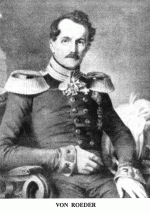
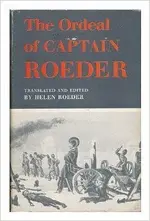

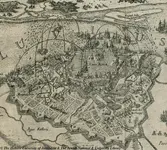
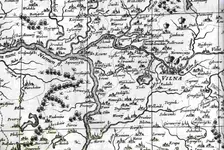
 ?
?
